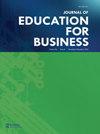MBA学生的亲社会行为:瑜伽和正念的作用
IF 1.3
Q2 EDUCATION & EDUCATIONAL RESEARCH
引用次数: 0
摘要
摘要本研究旨在探讨瑜伽与商科学生亲社会行为(PSB)之间的关系,并评估瑜伽对MBA学生学业成绩的影响。正念的中介作用也被检查。这项研究调查了255名MBA学生。在为期20周的瑜伽课程前后,测量了MBA学生的瑜伽练习、正念、PSB和管理案例研究中的表现。研究发现,瑜伽练习可以显著提高PSB和学业成绩。为了评估正念的中介作用,我们使用PROCESS宏进行回归分析。研究发现,正念在瑜伽和PSB之间起着中介作用。作为部分冥想的结果,对PSB的影响有一半来自于更高的正念,而剩下的一半直接来自于瑜伽的练习。正念也在瑜伽和学习成绩之间起到中介作用。就MBA学生获得的成绩而言,58%的增长来自正念,而剩下的42%则直接来自瑜伽练习。在商学院学生中增加PSB是促进未来更全面、更有社会责任感、更以价值为基础、更以道德为导向的管理实践的一个合乎逻辑的步骤。这项研究展示了瑜伽如何使练习瑜伽的MBA学生受益,并满足社会需求。本文章由计算机程序翻译,如有差异,请以英文原文为准。
Prosocial behavior of MBA students: The role of yoga and mindfulness
Abstract This study explores the relation between yoga and prosocial behavior (PSB) of business students and evaluates the impact of yoga on their academic performance in an MBA program. The mediating role of mindfulness is also examined. The study covers a cohort of 255 MBA students. Individual MBA student’s yoga practice, mindfulness, PSB, and performance in management case studies was measured before and after a 20-week yoga programme. The study found that yogic practices significantly increase PSB and academic performance. To assess the mediating role of mindfulness, PROCESS macro was used for regression analysis. It was found that mindfulness acts as a mediator between yoga and PSB. As a result of partial mediation, half the effect on PSB comes from higher mindfulness while the remaining half comes directly from the practice of yoga. Mindfulness also acts as a mediator between yoga and academic performance. In case of the grades obtained by the MBA students, 58% of increase comes through mindfulness whereas the remaining 42% comes from yogic practices directly. Increasing PSB among business school students would be a logical step toward promoting future management practices that are more comprehensive, socially responsible, value-based, and ethically-oriented. This study demonstrates how yoga can benefit MBA students who practise it as well as meet social demands.
求助全文
通过发布文献求助,成功后即可免费获取论文全文。
去求助
来源期刊

Journal of Education for Business
EDUCATION & EDUCATIONAL RESEARCH-
CiteScore
3.10
自引率
8.30%
发文量
32
期刊介绍:
The Journal of Education for Business is for those educating tomorrow''s businesspeople. The journal primarily features basic and applied research-based articles in entrepreneurship, accounting, communications, economics, finance, information systems, management, marketing, and other business disciplines. Along with the focus on reporting research within traditional business subjects, an additional expanded area of interest is publishing articles within the discipline of entrepreneurship. Articles report successful innovations in teaching and curriculum development at the college and postgraduate levels. Authors address changes in today''s business world and in the business professions that are fundamentally influencing the competencies that business graduates need. JEB also offers a forum for new theories and for analyses of controversial issues. Articles in the Journal fall into the following categories: Original and Applied Research; Editorial/Professional Perspectives; and Innovative Instructional Classroom Projects/Best Practices. Articles are selected on a blind peer-reviewed basis. Original and Applied Research - Articles published feature the results of formal research where findings have universal impact. Editorial/Professional Perspective - Articles published feature the viewpoint of primarily the author regarding important issues affecting education for business. Innovative Instructional Classroom Projects/Best Practices - Articles published feature the results of instructional experiments basically derived from a classroom project conducted at one institution by one or several faculty.
 求助内容:
求助内容: 应助结果提醒方式:
应助结果提醒方式:


